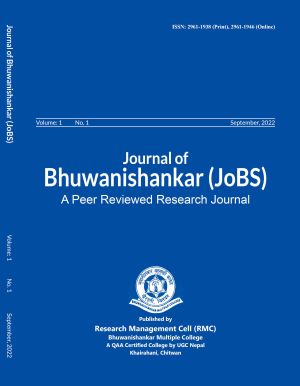Traumatic Racial Encounters in Toni Morrison's God Help the Child
DOI:
https://doi.org/10.3126/jobs.v1i1.49493Keywords:
memory, trauma, acting out, social fabric, double consciousness, indelible mark, residual and dominant cultureAbstract
This study examines the cultural trauma of characters with a cultural embodiment of race in the sophisticated but claustrophobic contemporary American society. Morrison's God Help the Child (2015) projects pain and trauma that live under the colored skin as a part of the author's and her character Bride's immense suppression of desire as a triggering force to past memories. Further, this research explores how traces of slavery in the past reconstitute trauma and how the interplay between dominant and residual cultures shapes the trauma of the African Americans. Morrison reveals the inter-racial and intra-racial conflicts in new generations of Americans by presenting the traumatic mind of her protagonist Bride who reconfigures traumatic history through critical acting out and working through trauma. Eventually, she succeeds in recovering and turning her grief into strength. The way through which such trauma is coped with is a researchable issue. It unfolds an individual's consciousness of racism and its influence on the individual psyche as a part of cultural trauma. Further, it unveils the inter-racial and intra-racial consciousness among the African Americans as they develop some guilt complexes within themselves due to their double consciousness and ambiguity contrary to social values. This is an internal conflict experienced by them in an oppressive society.
Downloads
Downloads
Published
How to Cite
Issue
Section
License
Copyright (c) 2022 RMC, Bhuwanishankar Multiple College

This work is licensed under a Creative Commons Attribution-NonCommercial-ShareAlike 4.0 International License.
This license allows reusers to distribute, remix, adapt, and build upon the material in any medium or format for noncommercial purposes only, and only so long as attribution is given to the creator. If you remix, adapt, or build upon the material, you must license the modified material under identical terms.




